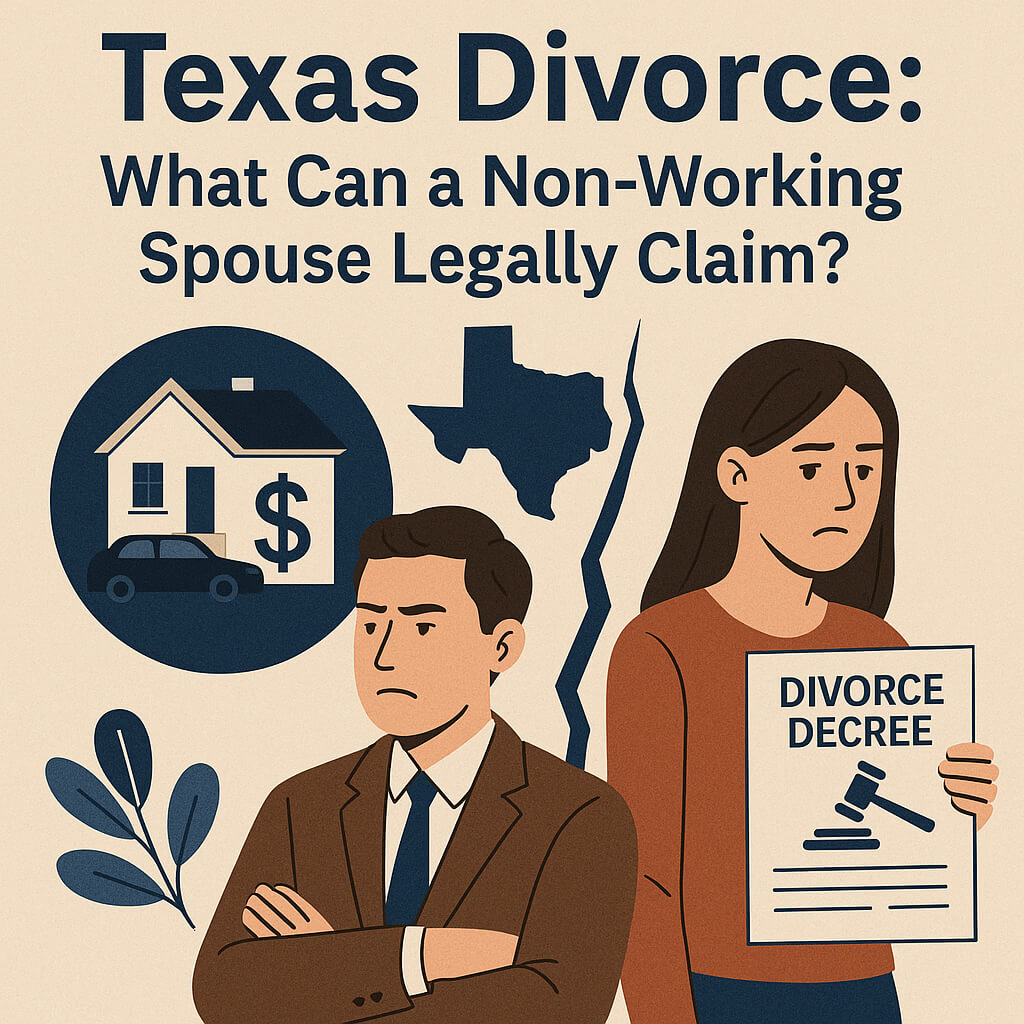Legal Protections for Non-Working Spouses in Texas Divorce
Going through a divorce when you haven’t been working can feel intimidating. But Texas law doesn’t leave non-working spouses out in the cold. Whether you’ve been managing the household or raising kids, your contributions matter. Here’s what you need to know about your legal rights and financial options during a Texas divorce.
Texas Community Property Laws and Division of Assets
Let’s start with how property is divided. In Texas, anything acquired during the marriage is generally considered community property. That includes your spouse’s paycheck, savings, the house, and even retirement accounts. Just because your name isn’t on something doesn’t mean you don’t have a right to it.
Separate property – such as gifts, inheritances, or anything you owned before the marriage – stays with the original owner. But everything else gets divided in a way that’s “just and right,” according to Texas Family Code § 7.001.
Now, that doesn’t mean it’s always split 50/50. The court looks at things like:
- Who earned what
- Who stayed home to raise the kids
- Who helped the other spouse advance in their career
- Whether there was any misconduct like infidelity or abuse
Homemaking counts. So do unpaid contributions that supported your spouse’s success. You may be entitled to a larger share based on those factors.
Eligibility for Spousal Maintenance (Alimony)
Spousal maintenance – or alimony – isn’t automatic in Texas, but it is possible under the right circumstances. The key is showing that you can’t meet your basic needs after the divorce.
Here’s when a court may award support under Texas Family Code § 8.051:
- Your marriage lasted at least 10 years, and you can’t earn enough to support yourself
- You have a disability that limits your earning ability
- You’re the caregiver for a child with a disability
- You were a victim of family violence within the last two years
Maintenance isn’t forever. Courts usually cap it at:
- 5 years for marriages of 10 to 20 years
- 7 years for 20 to 30 years
- 10 years for over 30 years
They’ll also weigh factors like your age, health, job history, and education. If you’re able to become self-supporting with some time and training, the court may give you temporary support to help bridge the gap.
Can’t qualify under the law? There’s still an option. You and your spouse can agree to contractual alimony, even if a judge wouldn’t order it.
Child Support and Custody Considerations
If you’ve been the primary caregiver, that role won’t be ignored. Texas courts focus on what’s best for the children – not who has the higher income.
You may be awarded primary custody, which typically comes with the right to receive child support. Support amounts are based on your spouse’s income and how many children you have, according to Texas Family Code § 154.001.
And just because you don’t have a job doesn’t mean you’ll lose custody or be pressured into returning to work right away. The courts understand that raising kids is a full-time job in itself. They’ll consider that when making custody and support decisions.
Retirement Accounts and Long-Term Financial Rights
One of the most overlooked – but most valuable – assets in a divorce is retirement. If your spouse has been building a 401(k), pension, or IRA during the marriage, you have a right to part of it.
To divide these accounts, your attorney will likely need a Qualified Domestic Relations Order (QDRO). This court order lets funds be transferred to you without triggering taxes or penalties.
Also, if you’ve been married for 10 years or more, you might qualify for Social Security benefits based on your spouse’s record. This can provide additional stability down the line, even if you’ve never worked outside the home.
Key Mistakes Non-Working Spouses Should Avoid
Here’s where many non-working spouses trip up during divorce – and how you can avoid doing the same:
- Not documenting your contributions: Keep records of how you supported the household, helped raise the children, or made sacrifices for your spouse’s career. Those details matter.
- Ignoring retirement accounts: These can be worth more than the house or car. Make sure they’re part of the settlement.
- Rushing to settle: Don’t let fear or pressure push you into signing an unfair agreement. Take time to understand your rights and review everything with a lawyer.
Common Scenarios for Non-Working Spouses in Texas Divorce
Every divorce is unique, but certain situations come up often – especially when one spouse has stayed home or made sacrifices to support the marriage. Here’s how Texas law may treat some of the most common scenarios:

You stopped working to raise the kids
If you left your job or never entered the workforce because you were raising children, the court sees that as a legitimate contribution. Your caregiving role matters – especially when it impacted your ability to earn an income or gain experience. This can help you qualify for a larger share of property or even spousal maintenance.
You supported your spouse through school, then stayed home
Maybe you worked full-time while your spouse earned a degree, then stayed home when the kids came along. In that case, you helped build their earning power and made sacrifices of your own. Courts often consider this when dividing assets or awarding support. It’s not uncommon for the non-working spouse to receive more property or longer-term maintenance in this situation.
You managed a household during a long marriage
If you’ve been married for 20 or 30 years and have spent most of that time managing the home, courts typically take a generous view of your contributions. You may be eligible for longer-lasting support and a strong claim to retirement benefits and savings. Long marriages often lead to more favorable outcomes for non-working spouses.
You left the workforce due to health issues
If health problems kept you from working during the marriage – or if they will prevent you from working after the divorce – the court can factor this into both property division and support. You may qualify for spousal maintenance under Texas Family Code § 8.051 due to your limited earning capacity.
FAQs About Non-Working Spouses and Texas Divorce
What if I never worked during the marriage?
You still have rights to community property, and you may qualify for spousal maintenance or other support depending on your circumstances.
Can I keep the house if I don’t have an income?
Possibly. If staying in the home supports your children’s stability or makes sense financially, the court may award it to you – especially if you’re receiving spousal or child support.
How long does spousal maintenance last in Texas?
Usually between 5 and 10 years, depending on how long you were married and how long it will take you to become self-sufficient.
Will I have to go back to work?
Maybe, but not always right away. Courts consider your age, health, skills, and whether you’re caring for young or special-needs children.
What happens if my spouse hides money?
You can ask the court to require full disclosure. If assets were hidden, the judge can impose penalties and give you a larger share of the property.
Secure Your Financial Future After Divorce
If you’re a non-working spouse facing divorce in Texas, you’re not powerless. You have rights – and more options than you might think. The key is getting clear guidance and standing firm. An experienced family law attorney can help you claim what you’ve earned, protect your children, and build a stable future.

